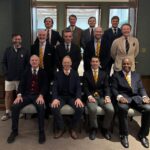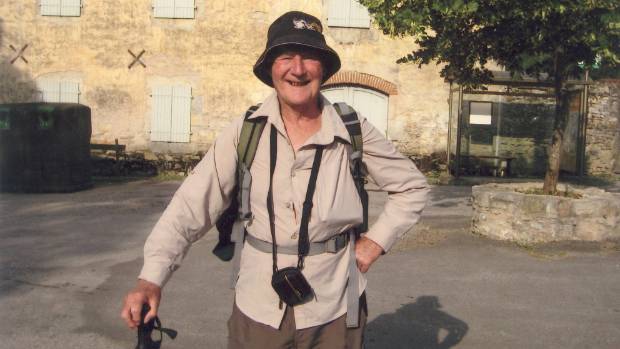The Haileybury Society is saddened to learn of the death of Leonard Crawford Bayliss (B 41) on 19 January 2018, aged 90. Len was our Overseas Secretary in New Zealand (North Island) for many years. Below is an obituary from a New Zealand newspaper sent to us by his son, Jeremy.
Two silver spoons
Long before his famous clashes with prime minister Robert Muldoon, a young Len Bayliss was already defiantly staring down authority.
The London teenager born with “two silver spoons” in his mouth had access to pretty much everything: the best education, family wealth, social status. But it wasn’t enough.
Barely into his teens, he declared to his father that he would be emigrating.
A few years later he would make good on that declaration. To the benefit of this country and its economic direction.
Naval service
But first he needed to find his own direction, so a young Len Bayliss looked to the sea. Like his father, Percy Bayliss, he chose the armed services and signed up for the Navy towards the end of World War II.
Percy Bayliss had hardly been home through two world wars. He emerged from both as a successful entrepreneur, says Len’s son, Jeremy.
“He collected the cases the American cars were sent in and chopped them up for firewood, sold them in London, then had one of the first coffee shops in Hyde Park.”
Social conscience
That money funded Len’s life and education in various boarding schools, while his father entertained his third wife. But the greater, deeper lessons were delivered by a life lived through the Great Depression.
“The unemployment and the hunger burned into my consciousness pretty hard,” Len recalled in an interview in 1984.
That awareness of both his own privilege and the struggle of others was further awakened in the dark depths of various navy vessels he served on. He worked with many men who never saw the inside of a boarding school, would never have the opportunities he had.
“It was a real turning point that he talked about,” says Jeremy. “His time under the decks really gave him a good understanding of how the poor were less advantaged. He really felt he’d been blessed and lucky and that he should do something with it.”
He was certainly “blessed and lucky” to make it through the war unscathed.
“The Germans gave up just as he joined and then he got sent to Singapore and the Japanese gave up as he turned up,” says Jeremy, “so he was always very proud of that thought that he was the key influence for the Germans and the Japanese.”
MA at Cambridge
Len had always been keen on history and politics and saw economics as a natural extension of that interest. He left the navy in 1948 to study at Cambridge University, where the two-year degree for an ex-serviceman became three years and a Master of Arts, with study including the politics and history of economics, principles and policy.
A “marvellous” education sorted, now Len could make good on that bold declaration a decade earlier. He considered America, Canada and South Africa, among others.
Emigration to New Zealand
The choices were narrowed down to Australia and New Zealand, and Len was convinced on the merits of the latter during a “cup of tea” in London with Alex Ross, the Reserve Bank Deputy Governor at the time. That and his fear of Australia’s spiders and snakes.
He arrived in 1951 to a role as an economist with the Reserve Bank. Wool was booming, the economy was highly regulated, 1950s New Zealand was a little disappointing – “it looks like a real slum”, Len remembered thinking – but he was part of a bright, young team, “a hot bed of discussion”.
“We didn’t do very much then,” Len said in 1984. “We spent an awful lot of time talking and rushing off to the pub at 5 o’clock.”
He might have been new to the country, but as son Jeremy recalls, Len was an avid, ferocious reader always searching for the wider truth and a greater understanding of how economics impacted on people.
“He was incredibly well read on everything, and widely read. He didn’t just read economic papers. My memory is of our home of books, bookshelves of books. And every side he looked at.”
But it was an education not bound by the written word.
The importance of agriculture
“You couldn’t be an economist in New Zealand if you didn’t understand agriculture,” Len recalled in an interview. “I made a big effort to understand farming. I used to spend all my holidays on farms . . . a huge range of contacts, the Dairy Board, the Wool Board, the Meat Board . . . and so on.”
As his career progressed and he learnt more of what made this and other countries’ economies tick, Len progressed from participating in that “hotbed of discussion” to leading the debate.
Over the next couple of decades as his profile grew, Len’s devotion to debate, his belief that “controversy is the stuff of democracies” would be rewarding and damaging in equal measure. In 1961 he was seconded to Treasury – “right in the middle of things” – and then joined the Monetary and Economic Council, where he wrote a number of influential reports on the financial system, some of which made front-page news.
Chief Economist, Bank of New Zealand
In 1966 Len was appointed Chief Economist at the Bank of New Zealand, and he used the position and associated public speaking role as a platform to push for more liberalisation and reform of the economy to combat growing inflation, interest rates and unemployment.
He became the counterpoint to the government, a go-to man for the media, the most prominent economist of his generation who helped pave the way for the more public face of economic debate, and modern counterparts like Cameron Bagrie and Shamubeel Eaqub.
There were setbacks – a campaign to review the country’s monetary policy was “turned down flat” by Reserve Bank Governor Alan Low (“he wrote a letter back that was almost insulting in its brevity”). But there were highlights too. In 1975, Len was called up to be part of the prime minister’s advisory group. It was believed Muldoon had asked for the opinionated economist personally.
It began well, says Jeremy.
“He spoke about Muldoon as being an incredible person: the intellect, really had a fantastic working relationship with him.”
Len said “he was the best boss I’ve ever had. Absolutely decisive.”
He worked with head of the Prime Minister’s Department, Bernie Galvin, to encourage various reforms, laying a foundation for change that would include, among other things, deregulation of monetary policy. That attracted world attention. “We went from the most regulated to one of the more liberal financial markets in short order,” Len said. Even the Australians were envious.
From supporter to critic
But after Len returned to the BNZ he watched over ensuing years as Muldoon tightened his grip and the economy. Len fumed. He became an outspoken critic of the government’s policies, and in turn Muldoon became an outspoken critic of his former adviser. He derisively mocked him as “the darling of the Rotary circuit”.
That brought pressure on the bank to rein in their chief executive. It was as unrelenting as Len’s critique in the media.
Resignation and consultancy
When he finally resigned in 1982 to take up a consulting role with Wellington sharebroker Harcourt Longuet Hume and Co, the media was abuzz with suspicions of conspiracy and political thuggery. Len, for once, kept his own counsel. Jeremy believes his father was “intellectually delighted to be free of the shackles of the bank”.
In the following years Len’s influence was increasingly away from the public eye. He kept in touch with a number of finance ministers and prime ministers and supported the broad liberalisation of Rogernomics, but was concerned at its implementation and impact on the vulnerable.
There were other consultancy roles and directorships, including Mainstay Ltd, NZ Govt Life/Tower Ltd, and the Bank of New Zealand.
Len was a keen walker, right up to his last weeks, and an avid traveller with his wife of 64 years, Vivienne.
Photo: Len Bayliss takes a breather during a walk in the Dordogne Valley, France, with son Jeremy. He was an avid walker and, with his wife Vivienne, a keen traveller.
More from The Haileybury Society
- HYT Uganda Update: A Lanmark Year of Groth, Innovation, and Impact

- £500 Travel Grant Awarded for Clinical Placement in Peru – Emily Jacobs (M13)

- World Champions & OHs Take to the Court at Queen’s

- Design, Politics and Discovery: A Solo Journey Across Europe

- Running for Mark: Barcelona Marathon Fundraiser

- Haileybury Society Bangkok Reunion

Unless otherwise stated, all content and images on this website and blog © The Haileybury Society, 2024, all rights reserved
Search stories by date
Unless otherwise stated, all content and images on this website and blog © The Haileybury Society, 2024, all rights reserved
